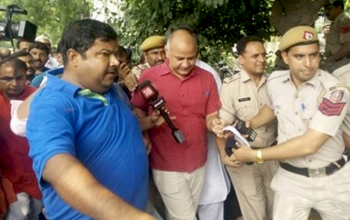New Delhi, Jun 26: Delhi Deputy Chief Minister Manish Sisodia and over 60 Aam Aadmi Party legislators were detained by police today while they were on their way to Prime Minister Narendra Modi's residence here to protest the arrest of a party MLA.

Mohaniya, who is also vice chairman of Delhi Jal Board, was picked up by a police team while addressing a press conference at his office in Khanpur. He was booked for allegedly misbehaving with a group of women who approached him with a complaint regarding water crisis in their locality.
Sisodia said although they were detained and taken to the Parliament Police Station, he and his partymen were ready to go to Tihar Jail.
"Modiji, you have arrested us and kept us in Parliament Street Police Station. We are ready to go to Tihar Jail. But do not stop the work of Delhi," he tweeted.
Delhi Chief Minister Arvind Kejriwal had earlier tweeted, "Complaint filed against Manish Sisodia yesterday. Manish will go to 7, RCR today to surrender himself before PM," he said.
Sisodia had yesterday tweeted, "Modiji, your enmity is with us. Arrest us. But do not stop the work of Delhi. We all are coming to surrender before you".
The Deputy CM had yesterday said when he went for a surprise inspection at Gazipur Mandi, some people who were running illegal business, registered a complaint alleging that he had threatened them.
"I am sure that Modiji will tomorrow, will convert this complaint into accusations like violence, eve teasing a girl and extortion and get me arrested," he had stated.
Referring to yesterday's incident, Special CP Law and Order North S B K Singh said the president of Gazipur Aadhti Association had given a letter at Gazipur Police Station stating that Sisodia adopted a "dictatorial attitude" on hearing their grievances during his visit to Gazipur Mandi.
"He was worried that Sisodia could get something wrong organised due to his position. No police action is made out in the matter," he said.





Comments
Modi is trying to get AAP Government in Delhi which is not at all good....AAP is doing a good job up there...
Modi cannot digest his loss in Delhi....stupidity...
Add new comment